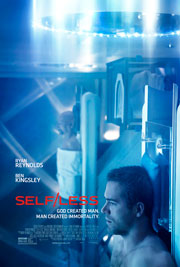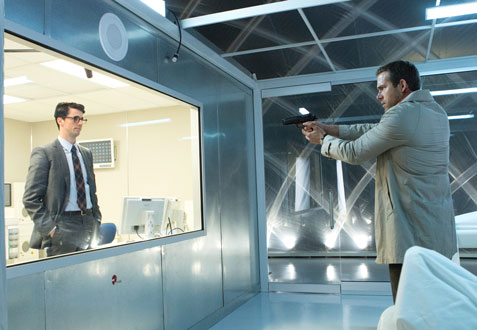
Nobody makes movies like Tarsem Singh. The polarizing visionary always brings his colorful personality to all of his projects, whether it’s a thriller (“The Cell”), a swords-and-sandals action pic (“Immortals”), or his adult fantasy masterpiece, “The Fall.” Tarsem tells stories through images, not only through dialogue. His latest film, “Self/less,” is his most story-heavy picture to date, but once again, he energizes a familiar tale with his bold eye.
The man responsible for some of New York’s most beautiful buildings, Damian Hale (Ben Kingsley), is dying. The billionaire industrialist is filled with regrets; he once thought his checkbook was sufficient enough to take care of his daughter, Claire (Michelle Dockery). Hale wants a second chance at life, and he receives it in the form of “shedding,” a procedure that transfers one’s consciousness to a young, healthy body. The company responsible for the technology is led by Albright (Matthew Goode), and his dream is to give the most important and influential figures – or failing that, the richest – more time on Earth. Hesitantly, Damian accepts Albright’s very pricey offer, and after the procedure, he’s no longer himself, but Edward (Ryan Reynolds), a young, handsome and retired millionaire. Damian is meant to start a new life in New Orleans where he can’t contact anyone from his past, but when he starts seeing Edward’s memories, Damian begins to ask questions about who he is and whose body he’s taken over.
“Self/less” is more of a thriller than a summer action movie; it’s a high-concept detective tale. Screenwriters David and Alex Pastor manage to tell a personal story, and like all good detective stories, they follow a detective haunted by his past. Damian Hale’s journey is as engaging as the film’s ideas. Ryan Reynolds hasn’t always had the best luck with studio films, especially in the summer, but he’s given more to work with this time around. There’s an actual arc for him to communicate.
Many of the twists in “Self/less” are telegraphed from the start, but the Pastors almost always manage to subvert expectations, even in the slightest of ways. Where they take Albright, for example, is quite obvious from a scene early on in the movie, but the reveal has an unexpected personal element to it. The screenwriters humanize the villain in a way that’s convincing. It’s possibly the only time the audience can sympathize with Albright, and it’s a well-played moment by Matthew Goode, who, unsurprisingly, is excellent. He’s not afraid to let Albright come off as one evil antagonist, playing him as a villain that completely believes in what he’s doing. In his head, he’s the good guy in this story. There’s enough moral complexity in “Self/less” to make Albright and Damian more than run-of-the-mill heroes and villains.
This is Tarsem’s most grounded film to date, which is saying a lot for a movie about sending one’s subconscious to another body. The camerawork and aesthetic choices are more restrained, but feature Tarsem’s personal touch. Routine montages are turned into a thing of beauty, and the same goes for the action scenes. Tarsem’s shootouts and car chases are intimately shot, almost always keeping the leads in the frame. None of the set pieces are huge, and the small scale serves the story and Tarsem’s camera well. The director also soaks up New Orleans, as the city plays an integral part in the film’s energy and atmosphere.
For a thriller, “Self/less” could use some tightening. There’s a tangent in the third act, involving the always-reliable Victor Garber, which slows the film down when it should be ramping up to its very slick and very cool finale. Tarsem’s film is modest in size and scale, and likely because of that, he was afforded to make some out-of-the-box choices, resulting in a film that’s both familiar and new.
Related Posts
Posted in: Entertainment, Movie Reviews, Movies
Tags: Ben Kingsley, Matthew Goode, Ryan Reynolds, Self/Less, Self/less review
















